Memories Of World War II
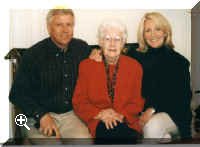 In May of this year, we had the great pleasure of meeting Thelma Jackson, who
had come to Elveden, from Lexington, Kentucky with her daughter, Diana and
son-in-law Doug. It had been Thelma's dearest wish to return to England and Elveden and to
re-live her time here as a WAAC. As a gift, for a very special birthday,
Thelma's family presented her with tickets for a trip to England; travelling
with her and visiting all the places she wished to see. It was lovely meeting
them all in Elveden, and seeing Thelma's dream come true; there were some
extremely emotional moments.
In May of this year, we had the great pleasure of meeting Thelma Jackson, who
had come to Elveden, from Lexington, Kentucky with her daughter, Diana and
son-in-law Doug. It had been Thelma's dearest wish to return to England and Elveden and to
re-live her time here as a WAAC. As a gift, for a very special birthday,
Thelma's family presented her with tickets for a trip to England; travelling
with her and visiting all the places she wished to see. It was lovely meeting
them all in Elveden, and seeing Thelma's dream come true; there were some
extremely emotional moments.
As requested, Thelma has kindly sent us her reminiscences, together with some
photographs to add to our collection.
Our grateful thanks to her.
Neville and Gillian Turner.

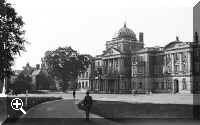 By
Thelma Jackson.
By
Thelma Jackson.
"On September 27, 1943 I arrived at Elveden Hall with a group of
American WAACS, yes we had an extra 'A' in those days - Women's Army Auxiliary
Corps.
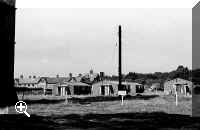 We
had been assigned to the 3rd Air Division of the 8th Air Force. The offices of
the 3rd Air Division were on the 1st and 2nd floors of the Hall and this is
where most of us worked.
We
had been assigned to the 3rd Air Division of the 8th Air Force. The offices of
the 3rd Air Division were on the 1st and 2nd floors of the Hall and this is
where most of us worked.
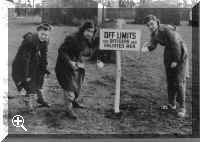 At
first we lived on the third floor of the Hall, but later, after the English
service-women left, we were moved to huts on the estate. I lived in Hut #9.
At
first we lived on the third floor of the Hall, but later, after the English
service-women left, we were moved to huts on the estate. I lived in Hut #9.
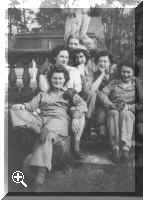 In
September the WAAC dropped the 'Auxiliary' and became part of the regular Army -
the WAC. We were all volunteers therefore we had the option of staying in or
going home. Only one girl left. The rest of us were sworn into the regular Army.
In
September the WAAC dropped the 'Auxiliary' and became part of the regular Army -
the WAC. We were all volunteers therefore we had the option of staying in or
going home. Only one girl left. The rest of us were sworn into the regular Army.
We worked fourteen days and were off for two. For the first few months we
went to London almost every time we had days off. [Pic
6:bus-icewell-horse-huts]A lorry picked us up in the late afternoon in front of
the Hall and took us to Thetford train station.
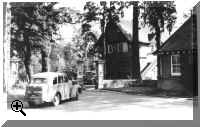 Mr.
Budden, who lived at one of the lodge gates, had a taxi service, which was used
often to go to Thetford. When my family asked me why we went to London when it
was being bombed, I answered that we just wanted to see London. Sometimes we
took the train to other towns. I remember a wonderful day in Cambridge (and was
it different when I was there in May 2000!). I spent one furlough in Scotland -
mostly Edinburgh.
Mr.
Budden, who lived at one of the lodge gates, had a taxi service, which was used
often to go to Thetford. When my family asked me why we went to London when it
was being bombed, I answered that we just wanted to see London. Sometimes we
took the train to other towns. I remember a wonderful day in Cambridge (and was
it different when I was there in May 2000!). I spent one furlough in Scotland -
mostly Edinburgh.
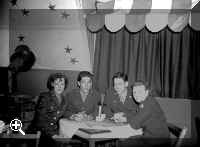 The
dining room for the officers was on the ground floor of the Hall but the WAC
mess hall was in a hut in the Park on the estate. We got one visit each week to
the PX (post exchange), which allowed us one candy bar and I believe, one pack
of cigarettes. We were issued English bicycles and we rode them a lot. They all
had numbers - mine was 175. Sometimes we went down the road to a pub - can't
remember the name - where there was only one rest room and we had to take our
own toilet tissue! Males and females stood in line waiting to go in, and chatted
with each other.
The
dining room for the officers was on the ground floor of the Hall but the WAC
mess hall was in a hut in the Park on the estate. We got one visit each week to
the PX (post exchange), which allowed us one candy bar and I believe, one pack
of cigarettes. We were issued English bicycles and we rode them a lot. They all
had numbers - mine was 175. Sometimes we went down the road to a pub - can't
remember the name - where there was only one rest room and we had to take our
own toilet tissue! Males and females stood in line waiting to go in, and chatted
with each other.
We had dances every few weeks at the base and one thing that sticks in my
memory is the playing of "God Save the King" as well as "The Star
Spangled Banner" at the end of each evening. There were eight or so bomb
groups under the 3rd Air Division and we were invited to dances at those
stations quite often. We went by lorry and got home in the wee hours.
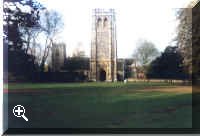 It was good to have a church so near and we went
sometimes. Working seven days a week didn't help our attendance. One Easter I
was in London and went to St. Paul's Cathedral for services.
It was good to have a church so near and we went
sometimes. Working seven days a week didn't help our attendance. One Easter I
was in London and went to St. Paul's Cathedral for services.
There were many romances and a few weddings but after we were out of the
service and home several couples that had met in Elveden married.
When we stood retreat it was in front of the Hall by the flagpole. I remember
the flag being flown at half-staff when President Roosevelt died.
I became friends with an ATS girl who spent some time in Thetford. We had
some good times together but she was transferred and we lost track of each
other. I also had a Scottish friend in Thetford whose husband had a chemist shop
there. He was away in service but she and her daughter lived over the closed
shop. A lot of us from the base went often to Paddy's Tea and Sandwich Shop in
Thetford. It was just up the street from the Bell Hotel.
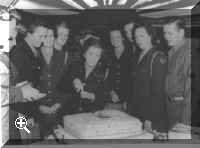 In the Spring of 1944 when the Allies were preparing for D-Day we could
travel no more than 25 miles from Elveden. During that time I was stricken with
a terrible stomach pain and was taken to the Army Hospital. It was appendicitis
and I had surgery. I was in a ward with about 15 other women and we were
released sooner than normal because D-Day was coming and beds would be needed.
In the Spring of 1944 when the Allies were preparing for D-Day we could
travel no more than 25 miles from Elveden. During that time I was stricken with
a terrible stomach pain and was taken to the Army Hospital. It was appendicitis
and I had surgery. I was in a ward with about 15 other women and we were
released sooner than normal because D-Day was coming and beds would be needed.
Finally the War in Europe was over and the entire base celebrated with an
all-night party.
After that I guess you could say we were tying up loose ends and looking
forward to going home. Of course we didn't know how long the Pacific War would
last.
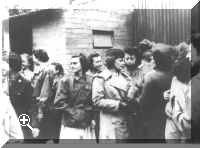 We left Elveden Hall on July 10, 1945, and flew from Scotland to the States.
Soon the Pacific War was over and I was discharged from the WAC.
We left Elveden Hall on July 10, 1945, and flew from Scotland to the States.
Soon the Pacific War was over and I was discharged from the WAC.
My two years at Elveden made me love and respect the English people and their
country. My fondest dream had been to return to England and Elveden and that
dream was realized in May 2000.
Thelma Jackson."
(Some of the photographs used are from the collections of Mike Fulkerson and
Louis Pennow).